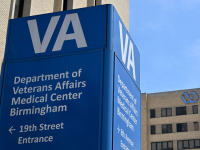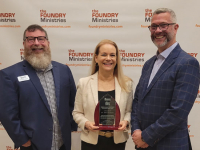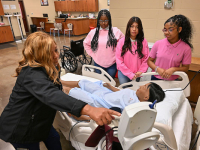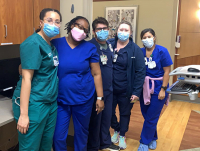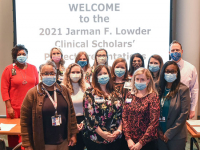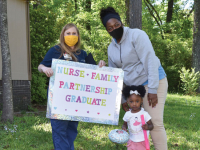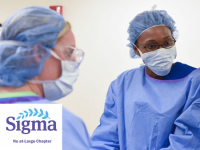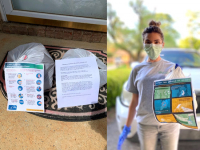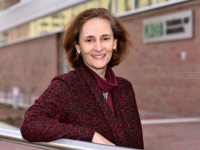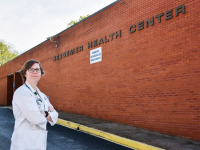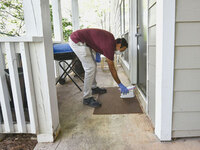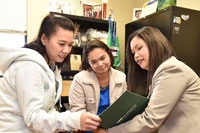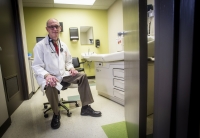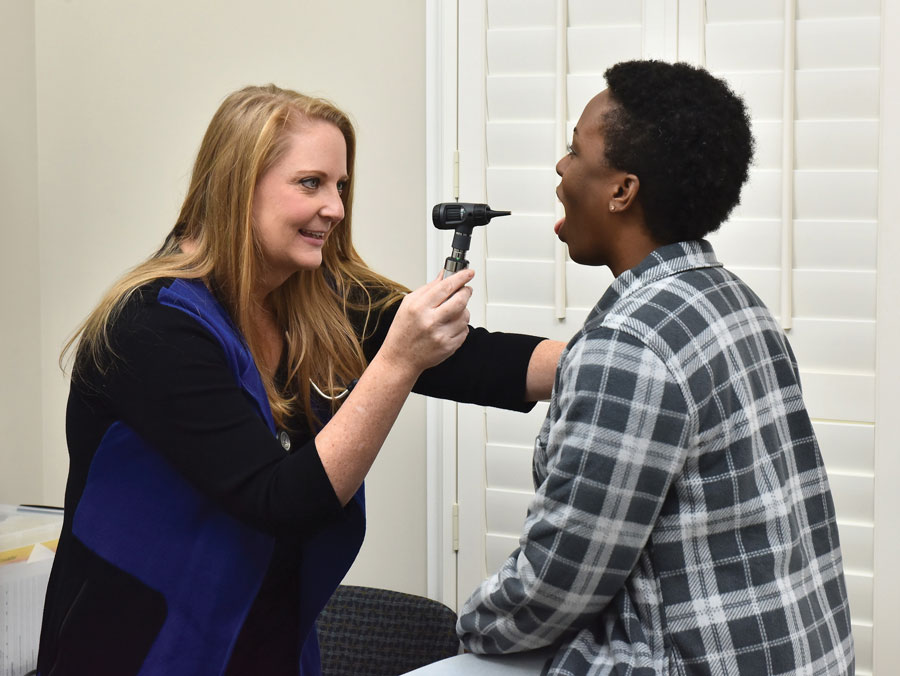 A focus on community care was central to the School’s founding and educational efforts to create the next generation of nurse leaders and to reach underserved populations. Opportunities to expand these efforts continued with the 1993 establishment of the Pan American Health Organization/ World Health Organization Collaborating Center (PAHO/WHOCC) for International Nursing. Through Dean Doreen Harper’s leadership and establishment of the Office of Clinical and Global Partnerships during her tenure, the UAB School of Nursing has accelerated its global focus by expanding partnerships and creating change on a global and local level.
A focus on community care was central to the School’s founding and educational efforts to create the next generation of nurse leaders and to reach underserved populations. Opportunities to expand these efforts continued with the 1993 establishment of the Pan American Health Organization/ World Health Organization Collaborating Center (PAHO/WHOCC) for International Nursing. Through Dean Doreen Harper’s leadership and establishment of the Office of Clinical and Global Partnerships during her tenure, the UAB School of Nursing has accelerated its global focus by expanding partnerships and creating change on a global and local level.
“The UAB School of Nursing’s partnership mission is not only consistent with the mission of our school, but also consistent with the core values of our profession,” said Jane H. Brock Florence Nightingale Endowed Professor and Associate Dean for Clinical and Global Partnerships Maria Rodriguez Shirey, PhD, MBA, RN, NEA-BC, ANEF, FACHE, FAAN. “Nursing is a caring profession, and through our clinical and global partnerships we are able to address health needs of all populations and improve health and health care locally and globally, especially for the medically underserved.”
Care for the Community
Throughout its 70-year history, UAB School of Nursing academic programs have prepared highly qualified nurses to enter their communities, provide high-quality care and empower citizens to engage in their care.
Since 2005, the School has experienced its greatest expansion of partnerships. With the creation of the Office of Clinical and Global Partnerships came a centralized focus on building nurse-managed clinics, key partnerships on and off campus, new residencies for graduates, and ultimately dedicated time and resources to the care for medically underserved populations throughout the state.
The arrival of former Professor and Associate Dean for Clinical and Global Partnerships Cynthia Selleck, PhD, RN, FAAN, in 2010, was an important step in expanding the partnerships. Selleck quickly took steps to ensure the School was leading the charge as new health care models, driven by teamwork and interprofessional partnerships, emerged.
“Nursing’s patient-centered approach is key to creating a health care model that provides health care, rather than what we sometimes see as a ‘sickness-repair system,’” said Selleck, who retired from the School of Nursing in 2018 and now holds the title of Professor Emeritus. “That’s where nursing thrives. For example, just consider one important health issue—the control of high blood pressure. Nurses are the ones who will spend the time necessary to educate you about your high blood pressure and what you need to do to reduce your health risks by reducing your blood pressure. We’ve seen this approach and this model succeed at our nurse-managed clinics where un- or underinsured individuals can receive quality care and advice on how to maintain their health.”
Under Selleck’s leadership, and with the eager participation of faculty, the School garnered more than $30 million in grant funding to open and support these nurse-managed clinics that care for the medically underserved.
“Today these clinical services continue to grow and provide a vital service to our community and have established a successful practice model that can be scaled up for care throughout the state, the southeast and the country,” Shirey said. “They also expand opportunities for our students to learn about culturally competent care for the medically underserved. By providing residency options within these clinics for recent graduates, we are able to provide new nurses with even more robust experiences on interprofessional teams and educate them on working with vulnerable populations.”
Seven and Counting
The School has seven nurse-managed clinics and initiatives providing primary and specialty care to thousands of medically underserved people across the lifespan in Alabama, including those with diabetes, heart failure, HIV, addiction and substance use issues, as well as expectant mothers.
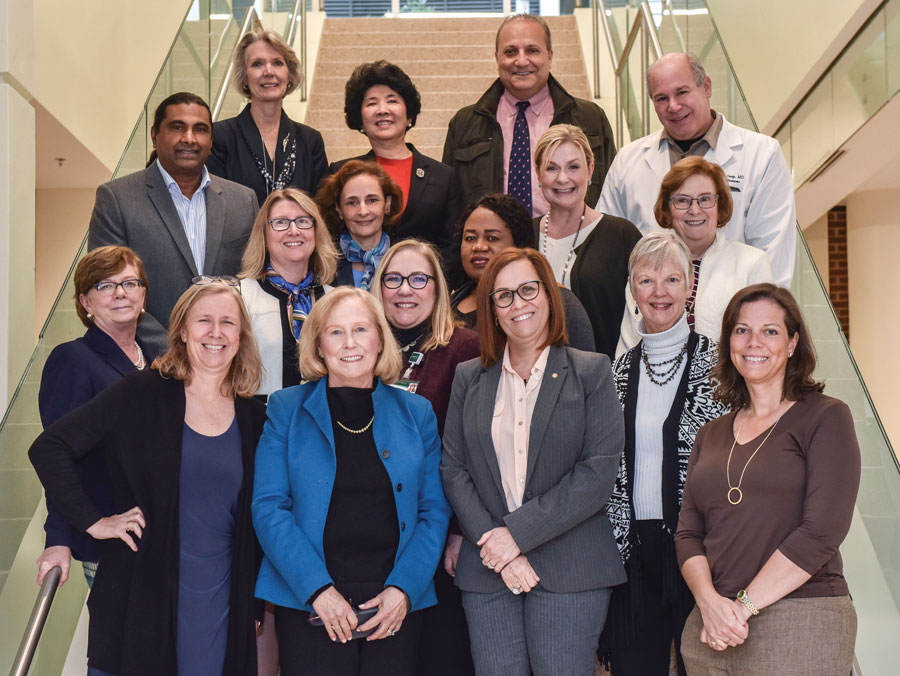 The Bessemer Neighborhood Health Center, founded in 2016, is a partnership between the School of Nursing, Cooper Green Mercy Health Services and Alethia House, one of the state’s largest providers of substance abuse treatment, HIV prevention, employment and housing to low-income individuals. This Federally Qualified Health Center is managed by UAB School of Nursing faculty, who provide quality health care for community members in need, especially the homeless population. The clinic provides primary care, mental health care and medication assisted addiction treatment for patients ages 14 and older.
The Bessemer Neighborhood Health Center, founded in 2016, is a partnership between the School of Nursing, Cooper Green Mercy Health Services and Alethia House, one of the state’s largest providers of substance abuse treatment, HIV prevention, employment and housing to low-income individuals. This Federally Qualified Health Center is managed by UAB School of Nursing faculty, who provide quality health care for community members in need, especially the homeless population. The clinic provides primary care, mental health care and medication assisted addiction treatment for patients ages 14 and older.
The School’s nurse-managed Providing Access to Healthcare (PATH) and HRTSA Heart Failure Clinic also provide interprofessional, team-based care to un- or underinsured patients recently discharged from UAB Hospital. In addition to nurse practitioner and physician visits, these clinics provide follow-up care and guidance for improved health to reduce hospital readmissions, while connecting patients with community services.
In 2018, the School opened its clinic at the WellHouse, a nonprofit organization that provides housing and support to survivors of human trafficking. It is the country’s first and only primary care clinic located inside a residential facility for human trafficking victims over the age of 17 and provides free, trauma-informed primary and women’s health care, integrated with behavioral health.
Also in 2018, the School took on its first clients in the Nurse Family Partnership of Central Alabama, which provides in-home visits to first-time, at-risk mothers throughout their pregnancy and during their child’s first two years of life. Beginning in just Jefferson County, the NFP has expanded to cover three Central Alabama counties, with three more counties to be added in late 2020.
Challenges presented by the COVID-19 pandemic highlighted the importance of these clinics and services. Many community members who receive care in these clinics also have other health conditions that make them more vulnerable to COVID-19 and rely on the clinics to connect with other important resources, such as food banks, job resources and medical supplies. The School of Nursing was quick to pivot most of its care in these clinics to telehealth to minimize gaps in care, but some, like the Bessemer Neighborhood Health Center, continued to see some patients in person when needed for proper care.
Harper said the School continues to grow its community-based clinics, telehealth and behavioral health clinics, and always tries to leverage existing clinical services to reach more people.
“Each time we start something new or expand, we ask, ‘How do we sustain the clinical services we have, leveraging faculty expertise, to make the most difference and provide the best clinical experiences for students?’” Harper said.
The School is embarking on a new partnership with i3 Academy, a public K-5 charter school in Birmingham’s Woodlawn Neighborhood, to provide care to its students. The site also will provide pediatric clinical experiences for the School’s undergraduate and graduate students. Additionally, the school is embarking on a psychiatric mental health nurse-managed clinic in Bibb County, Alabama to provide behavioral health services for rural Medicare populations.
Growing Residencies
The School also has continued to establish and grow nurse residencies with clinical partners to support newly hired post-baccalaureate and post-graduate NPs as they transition into practice. The residency programs focus on building decision-making skills, developing clinical leadership, and incorporating evidence-based practice into care delivery.
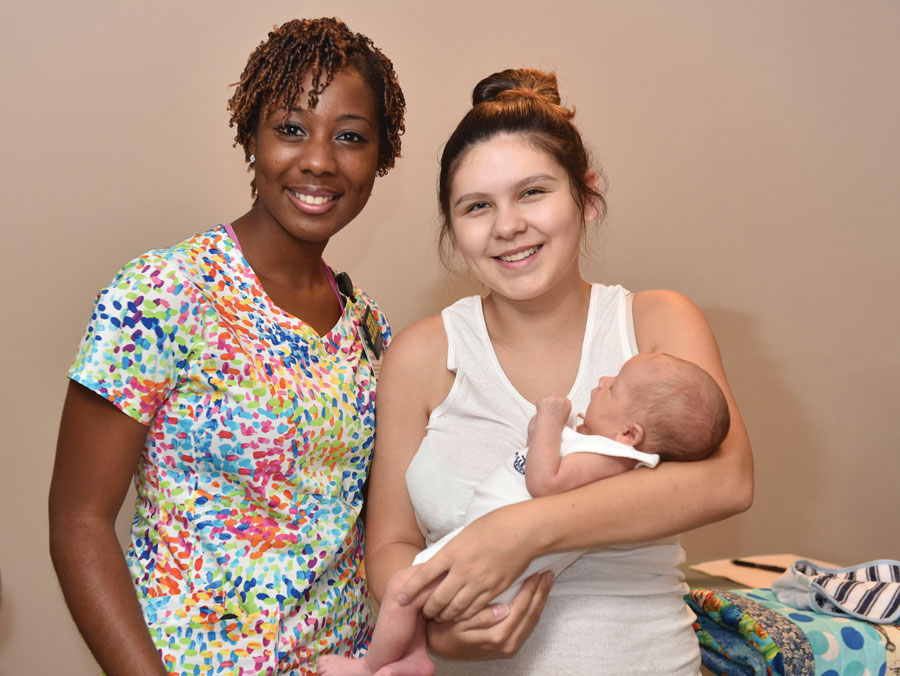 The School currently partners on four residencies—two at the Birmingham VA Medical Center, one at Children’s of Alabama and another with community partner Cahaba Valley Medical Care.
The School currently partners on four residencies—two at the Birmingham VA Medical Center, one at Children’s of Alabama and another with community partner Cahaba Valley Medical Care.
The School and Birmingham VAMC partner on the Post-Baccalaureate Nurse Residency and the VANAP-GE Psychiatric Mental Health NP Residency as part of their VA Nursing Academic Partnership that received the 2015 American Association of Colleges of Nursing Exemplary Academic-Practice Partnership Award. The Post-Baccalaureate Nurse Residency is one of only 17 in the nation’s VA medical centers and designed to smooth and increase the transition of entry level nurses in the VA system to competent professionals providing safe, quality health care.
The VANAP-GE Psychiatric Mental Health NP Residency is one of only four sites in the country that has a graduate residency program for psychiatric mental health nurse practitioners, offering a year-long paid residency within the BVAMC for recent mental health nurse practitioner graduates who have already passed their national certification exams.
The School also partners with Children’s of Alabama on a one-year residency for recent PMHNP graduates to meet the growing need for behavioral health care providers for children and adolescents in the state. Residents receive enhanced interprofessional practice experience, working with psychiatrists, psychologists, neurologists, pharmacists and case managers, even better preparing to address child and adolescent mental health needs once the residency is complete.
Graduates from the School’s family nurse practitioner master’s specialty track hone their skills as primary care providers through a one-year residency that has partnered Cahaba Medical Care, Jefferson County Health Department with the School. The residents work alternate weeks between multiple clinic locations, where they care for medically underserved populations.
Harper said the School is planning additional NP residencies that will launch soon in partnership with UAB Medicine and will to provide immersion into the depth of specialty in health care needed to address growing complex health care needs, especially those among the medically underserved.
“Through residencies with our community partners, and clinical experience at these clinics, we see a multiplier effect that benefits the workforce. Students learn alongside expert faculty and a new generation of nurses is educated and practice ready upon graduation,” Harper said. “We are fortunate in Birmingham and as a part of UAB to be able to reach several segments of our community and work to improve care here and across the South.”
Collaboration Across Partners
Clinical, research and education opportunities abound as part of the School of Nursing’s partnership with UAB Hospital and UAB Medicine, the UAB Nursing Partnership. This formal collaboration has been nationally recognized as a top academic/practice partnership by the American Association of Colleges of Nursing.
The School successfully transitioned five community care clinics to a telehealth or hybrid model during COVID-19, in addition to adapting to no-contact supply and medication drop-offs for patients who rely on these clinics for care.
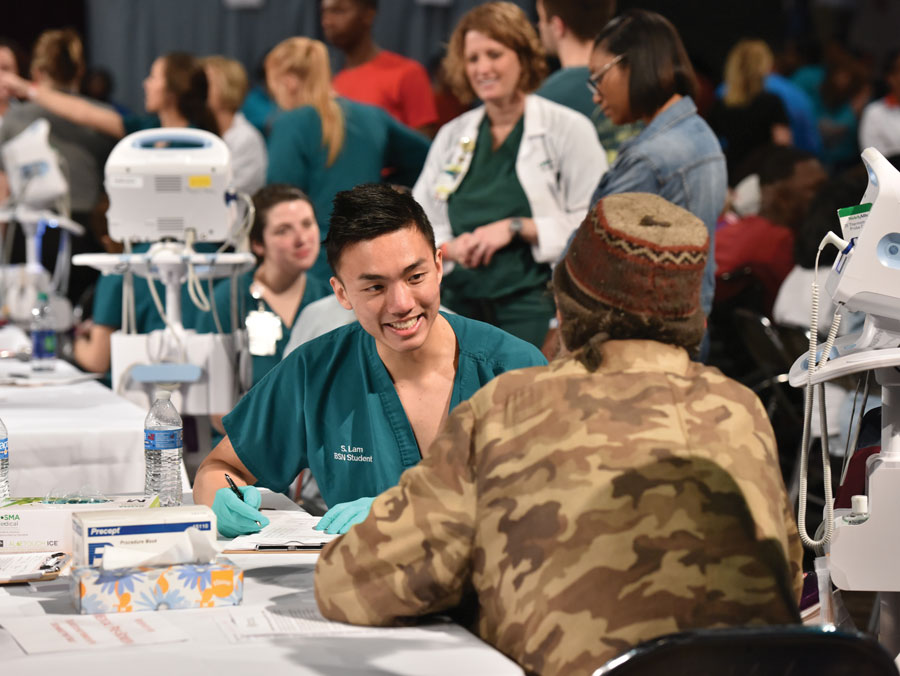 “UAB School of Nursing faculty and UAB Hospital staff collaborate on improvement, research and translation on a daily basis,” said UAB Hospital Chief Nursing Officer and UAB SON alumna Terri Poe, DNP, RN, NE-BC (BSN 1986, DNP 2013). “We have ongoing collaborations to develop solutions to nursing-sensitive topics, knowing that only through the investment in academic and clinical practice can we begin to chip away at concerns that seriously impact patient safety and quality of care.”
“UAB School of Nursing faculty and UAB Hospital staff collaborate on improvement, research and translation on a daily basis,” said UAB Hospital Chief Nursing Officer and UAB SON alumna Terri Poe, DNP, RN, NE-BC (BSN 1986, DNP 2013). “We have ongoing collaborations to develop solutions to nursing-sensitive topics, knowing that only through the investment in academic and clinical practice can we begin to chip away at concerns that seriously impact patient safety and quality of care.”
The UAB Nursing Partnership gathers resources from all three entities to accelerate the School’s and Hospital’s missions while benefiting students and faculty through research, experience and knowledge. When the partnership was formalized in 2016, it marked an important milestone for the academic/practice partnership and solidified the collaboration and innovation for which UAB is known.
The School also partners with Children’s of Alabama with faculty teaching onsite nurses to organize and conduct their own evidence-based projects through the Jarman Lowder Clinical Scholars Program. This program selects 10 nurses annually. Throughout the year, the program’s director, Associate Professor Tedra Smith, DNP, CRNP, CPNP-PC, CNE, serves as a mentor and supporter for each scholar and his or her project.
The School also has spent the better part of the past decade laying the foundation for and leading the development of interprofessional teams that are teaching and creating new models of care to improve the quadruple aim.
Professor and Chair of the Department of Acute, Chronic and Continuing Care Allison Shorten, PhD, RN, RM, FACM, FAAN, is Director of the Office of Interprofessional Curriculum (OIPC) in the UAB Center for Interprofessional Education and Simulation (CIPES). Shorten’s role in the OIPC is to guide the design and implementation of curricula for these interprofessional educational experiences.
Penni Watts, PhD, RN, CHSE-A, also is leading on campus as the Assistant Director of Interprofessional Simulation for Innovative Clinical Practice in CIPES. She supports and tracks interprofessional and other UAB Health System simulation experiences, including facilitator development courses and administrative, educational and technical expertise related to simulation.
Global Partnerships
In addition to partnerships across the bridge, the UAB School of Nursing is recognized for partnerships across the globe. In 1993, the UAB School of Nursing PAHO/WHOCC was established, making it the sixth nursing school in the nation and 28th worldwide to receive the designation.
Through the PAHO/WHOCC, the UAB School of Nursing works as a pacesetter in global health initiatives, primary health care and quality improvement in nursing education. Since 1993, it has been redesignated every four years since, with the most recent in 2019.
“Since its founding, our School has been on the forefront of enhancing nursing education, practice and research with the ultimate goal of improving health locally and globally,” Harper said. “Our continued designation as a PAHO/WHO Collaborating Center for International Nursing provides us an exemplary platform to continue this important work for our community, our state and the world.”
Since joining the School, Harper has remained steadfast in her emphasis on global perspective and local impact, commonly referred to as a “glocal” approach, increasing faculty involvement in global outreach and education from 30 to 70 percent.
“Dean Harper has championed ‘glocal’ well before it became a fashionable concept,” said PAHO/WHOCC Co-Director and Associate Professor Ada Markaki, PhD, RN, CCNS, PHCNS-BC. “This is a foundational concept we continue to use not only for faculty participating in global activities but also in our graduate and undergraduate courses to make sure that our students are competent in global health.”
Markaki joined the School in 2016 PAHO/WHOCC and the following year she led a Global Health Task Force of faculty and staff tasked with developing the UAB School of Nursing Framework for Global Health Action. The adopted framework captures faculty activities that meet the WHO’s sustainable development goals and identifies growth opportunities for leadership.
Under Markaki’s purview, the School’s International Visiting Scholars Program was expanded and streamlined, enabling select international faculty, post-doctoral fellows, clinicians, nursing administrators and PhD students to gain valuable short-term experiences in advanced nursing education, research and practice through individualized mentorship. Since 2010, more than 30 Scholars from eight countries have completed the program.
It provides exceptional mentorship and professional development to international scholars from low resource settings and strengthens UAB and the School of Nursing’s connections across the globe. In response to COVID-19 travel restrictions and challenges, an alternative virtual program was developed to offer greater flexibility and options to international scholars.
“This International Year of the Nurse and Midwife 2020, compounded by the COVID-19 pandemic, has underscored nurses’ key role and contributions across the globe,” Harper said. “Through our PAHO/WHOCC and ‘glocal’ efforts, we are making a difference in reducing health disparities across the Americas’ region.”
Focus on the Future
As the School looks toward its future, it is from a firm foundation of global and local interconnectivity. When Shirey took on the role of Associate Dean of Clinical and Global Partnerships in 2019, she acknowledged the importance of strengthening these partnerships in order to ensure their sustainability moving forward.
Partnerships are a core part of nursing, she said, and provide opportunity for enhanced care, enhanced nursing education, increased knowledge dissemination and enhanced resources for the School, its students and its community.
“UABSON is committed to its tripartite mission both in word and in action,” Shirey said. “Our Dean’s vision to invest in and grow the teaching, research and service missions is consistent with our school’s commitment to excellence. Our partnerships form the foundation of our important relationships and help to fuel our pursuit of new opportunities to achieve our mission. At the UABSON, we do not rest on our laurels and are always positioned for the next challenge. It is never boring at the UABSON.”

